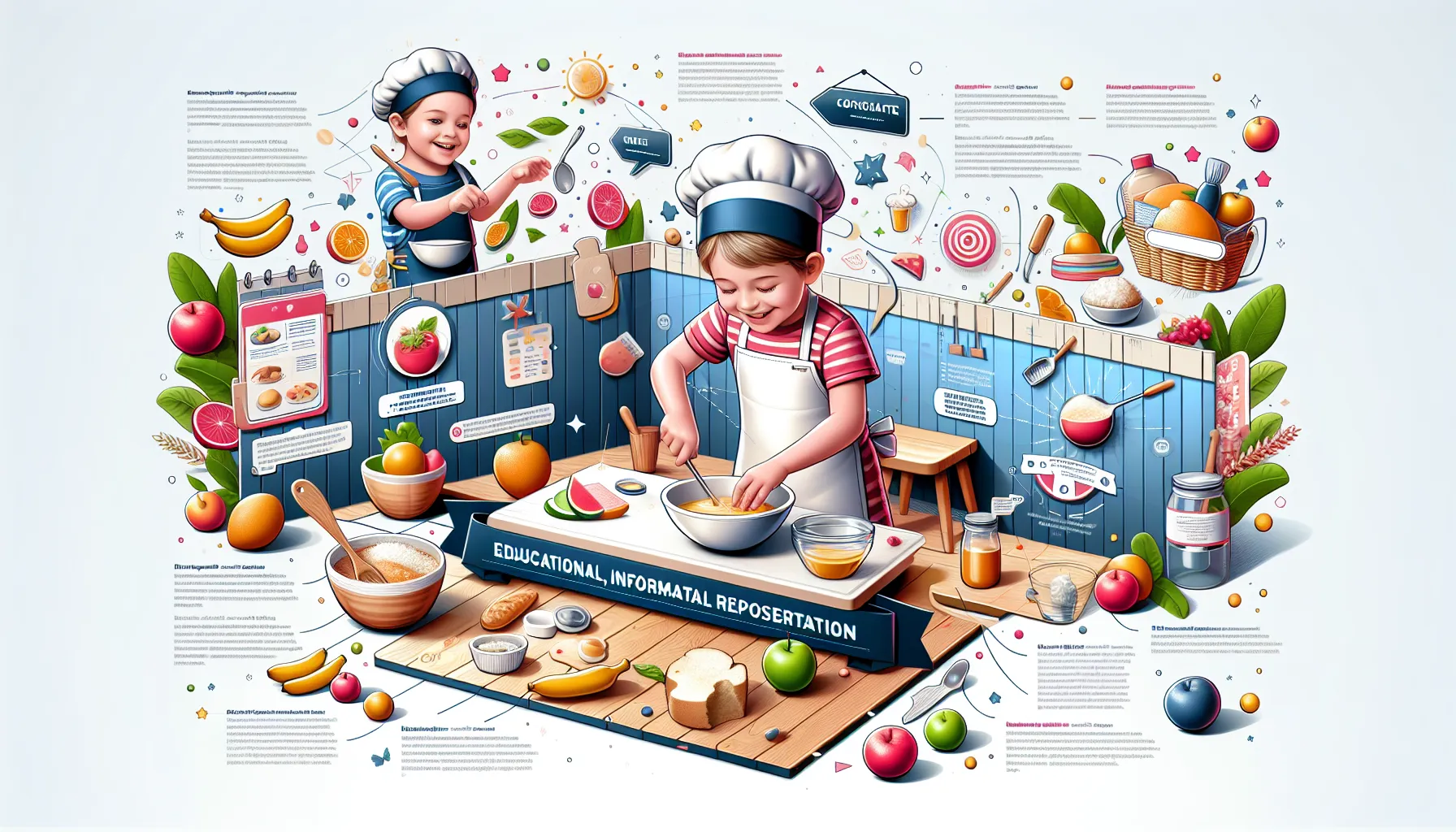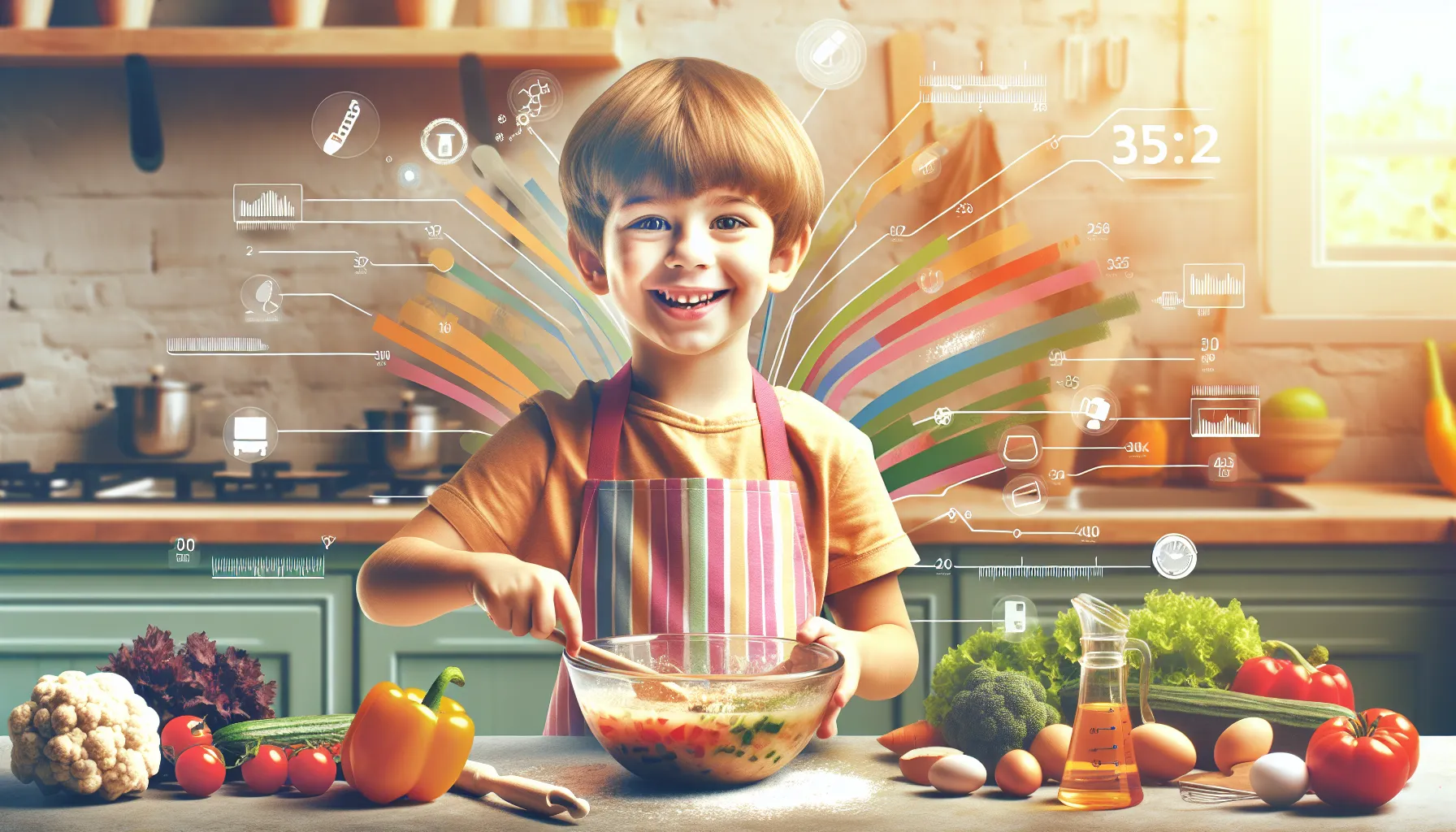
Key Takeaways
- Engaging children in cooking helps build essential life skills like following instructions, practicing patience, and developing problem-solving abilities.
- Common challenges include managing safety, maintaining attention spans, and overcoming intimidation by complex recipes or unfamiliar tasks.
- Turning cooking into an interactive and age-appropriate activity keeps children interested while minimizing risks and frustration.
- Cooking encourages creativity and promotes healthy eating habits as children explore and experiment with different ingredients and flavors.
- Overcoming cooking challenges fosters confidence, independence, and a sense of accomplishment in children.
- Simple recipes, a safe environment, and fun activities make cooking a joyful learning experience for both kids and adults.
Cooking with children can be a delightful mix of fun and learning, but how do we keep them engaged while teaching valuable skills? Kids thrive on activities that spark their curiosity and creativity, and the kitchen offers endless opportunities to explore. From measuring ingredients to decorating treats, every step can become an exciting challenge that encourages growth and confidence.
These cooking challenges aren’t just about making delicious dishes—they help children develop essential life skills. They learn to follow instructions, practice patience, and even discover a bit of science through mixing and measuring. Plus, it’s a wonderful way to spend quality time together, creating memories that last long after the kitchen is cleaned up.
Understanding Cooking Challenges For Children
Cooking challenges for children serve as a creative way to introduce them to the kitchen. While the idea is exciting, there are key factors to consider when involving kids in cooking tasks. One common hurdle is maintaining their focus. Children often get distracted, making it crucial to keep activities engaging and appropriately paced for their attention spans.
Another challenge is managing safety while allowing hands-on participation. Sharp tools, hot surfaces, and delicate ingredients can present risks. Choosing age-appropriate recipes and tasks minimizes potential hazards while still giving them a sense of responsibility.
Many children find certain cooking tasks intimidating. Measuring ingredients, following sequential steps, or handling unfamiliar foods can feel overwhelming to beginners. Breaking complex instructions into smaller, manageable steps boosts their confidence and helps them gradually build skills.
Mess and cleanup often become obstacles for families. Enthusiastic young chefs may leave a trail of flour and spills, which can be frustrating. Encouraging tidiness as part of the activity teaches accountability and keeps the process smoother.
Have you considered tailoring tasks to match your child’s abilities? Recognizing their skill level lets us create challenges that inspire effort without causing discouragement. By addressing these common hurdles, we can transform cooking into a joyful learning experience.
Common Cooking Challenges For Children

Cooking challenges often arise when children step into the kitchen. Understanding these difficulties helps us better support their learning journey and turn obstacles into opportunities for growth.
Safety Concerns In The Kitchen
Children face genuine safety risks while using tools and handling ingredients. Sharp knives, hot surfaces, and heavy pots require close supervision. We can reduce dangers by introducing kid-friendly tools and setting clear boundaries for areas or tasks that need adult oversight. Does your child know the basics, like washing hands before handling food or safely carrying items?
Difficulty With Complex Recipes
Lengthy or intricate recipes can overwhelm young cooks. Steps that feel simple to adults, like chopping or mixing, may become challenging without guidance. Breaking recipes into smaller, clear tasks makes them feel achievable. What if children learned one new technique per recipe instead of trying to tackle everything at once?
Limited Attention Spans
Sustained focus doesn’t come naturally for many children, particularly during detailed tasks. Long recipes with multiple stages might lead to frustration. Keeping the process lively with quick wins—such as decorating cookies or mixing batter—can hold their interest. How can we make cooking fun and engaging so their enthusiasm lasts?
Picky Eating Habits
Picky eating complicates recipe selection and participation. Children reluctant to try new foods may disengage from certain recipes. Inviting them to choose ingredients or experiment with small adjustments fosters curiosity. Could involving them in decision-making help turn meals into something they genuinely look forward to?
Benefits Of Overcoming Cooking Challenges

Taking on cooking challenges helps children grow in ways that extend beyond the kitchen. The process is full of valuable lessons that foster essential skills and positive habits they can carry forward. Let’s explore key advantages.
Developing Life Skills
Cooking challenges build foundational abilities. Kids learn to measure ingredients, follow instructions, and manage time. These tasks teach precision, focus, and responsibility. For example, cracking eggs or kneading dough encourages fine motor skills, while cleaning up after cooking promotes accountability.
Through repeated practice, children develop patience and adaptability. Mistakes like adding too much salt or missing a step provide opportunities to learn problem-solving. These real-world lessons equip kids to handle tasks independently in the future.
Encouraging Healthy Eating Habits
Challenges in the kitchen introduce children to wholesome ingredients. Involving them in meal preparation sparks curiosity about fruits, vegetables, and other nutritious foods. When they actively participate, they’re more likely to try new flavors and develop a positive attitude toward balanced eating.
Preparing meals also gives them a sense of ownership over their choices. When kids help make their snacks or meals, they’re less likely to rely on processed options. Simple tasks like blending smoothies or assembling a salad show them how fresh ingredients lead to delicious outcomes.
Boosting Confidence And Creativity
Facing and overcoming challenges boosts self-esteem. Successfully completing a recipe or mastering a new technique helps children see their progress in tangible ways. For instance, baking cookies successfully builds pride and reinforces belief in their abilities.
Cooking also encourages creativity. Kids experiment with colors, textures, and flavors while assembling meals. Activities like decorating cupcakes or mixing herbs into a dish fuel imagination and originality. Every finished dish instills confidence and inspires them to think inventively.
Tips To Help Children Overcome Cooking Challenges
Cooking with children brings joy and teaches valuable skills, but challenges can arise. By using effective strategies, we can turn these moments into opportunities for growth and enjoyment.
Start With Simple Recipes
Simple recipes build confidence and reduce frustration. Begin with dishes requiring minimal ingredients, such as pancakes or fruit salads. Small tasks, like stirring batter or measuring sugar, make children feel accomplished. What are some favorite easy recipes you can try together?
Create A Safe Cooking Environment
Safety must come first when involving kids in cooking. Use child-safe tools like plastic knives and silicone spatulas. Organize the workspace to prevent accidents, keeping sharp tools and hot items out of reach. Teach proper handwashing and food safety practices. How can we make cooking spaces inviting and secure?
Make Cooking Fun And Interactive
Interactive sessions keep children engaged and interested. Turn steps into games, like timing how quickly they can whisk or guessing ingredient quantities. Use storytelling to describe the recipe process. Music or themed aprons can add excitement. What small tweaks can make your next cooking activity more playful?
Encourage Experimentation And Patience
Experimentation helps children learn and creates a sense of exploration. Let them choose toppings for a pizza or mix ingredients for cookies. Praise their ideas to boost confidence. Discuss that mistakes, like overmixing dough, are part of learning. How can we approach such moments as chances to teach resilience?
Conclusion
Cooking challenges for children offer a unique opportunity to combine learning, creativity, and fun. By tailoring tasks to their abilities and creating a safe, supportive environment, we can help kids develop essential skills while fostering their curiosity and confidence.
When we approach cooking as an adventure rather than a chore, children are more likely to embrace the experience and carry these lessons with them for years to come. Let’s turn the kitchen into a space where memories are made, skills are built, and imaginations thrive.
Frequently Asked Questions
Why is cooking with children important?
Cooking with kids is both educational and fun. It helps them develop life skills like following instructions, practicing patience, and managing time. Additionally, it encourages creativity, strengthens family bonds, and builds confidence.
What are the main benefits of involving children in cooking?
Children learn essential skills like measuring ingredients, time management, and problem-solving. Cooking also fosters healthy eating habits, enhances creativity, and helps them understand basic science concepts.
How can I ensure safety when cooking with kids?
Focus on age-appropriate tasks, use kid-safe tools, and always supervise kitchen activities. Clear organization and teaching proper handling of ingredients and tools are essential to prevent accidents.
What are some common challenges kids face while cooking?
Children often struggle with complex recipes, limited attention spans, and safety concerns. Picky eating habits can also make participation less engaging without proper encouragement.
How can I keep children engaged during cooking?
Make cooking fun by using games, storytelling, or music. Involve them in choosing ingredients, break tasks into smaller steps, and focus on recipes that offer quick, satisfying results.
What should I do if my child feels intimidated by a recipe?
Start with simple recipes that require minimal ingredients. Break down the steps into manageable tasks, teaching one skill at a time to build confidence.
How can cooking help children explore healthy eating?
Children are more likely to try nutritious foods they’ve prepared themselves. Cooking helps them learn about ingredients and fosters curiosity about healthier options.
How do I encourage my child to experiment in the kitchen?
Allow them to make choices and try new flavors or presentation styles. Emphasize that mistakes are part of the learning process and encourage creativity throughout.
What types of recipes are best for beginners?
Choose recipes with simple ingredients and minimal steps. No-bake dishes, sandwiches, or easy desserts are great options for building confidence.
How can cooking together strengthen family bonds?
Cooking creates opportunities for teamwork, communication, and shared experiences. It’s a fun way to build lasting memories while enjoying a shared accomplishment.

